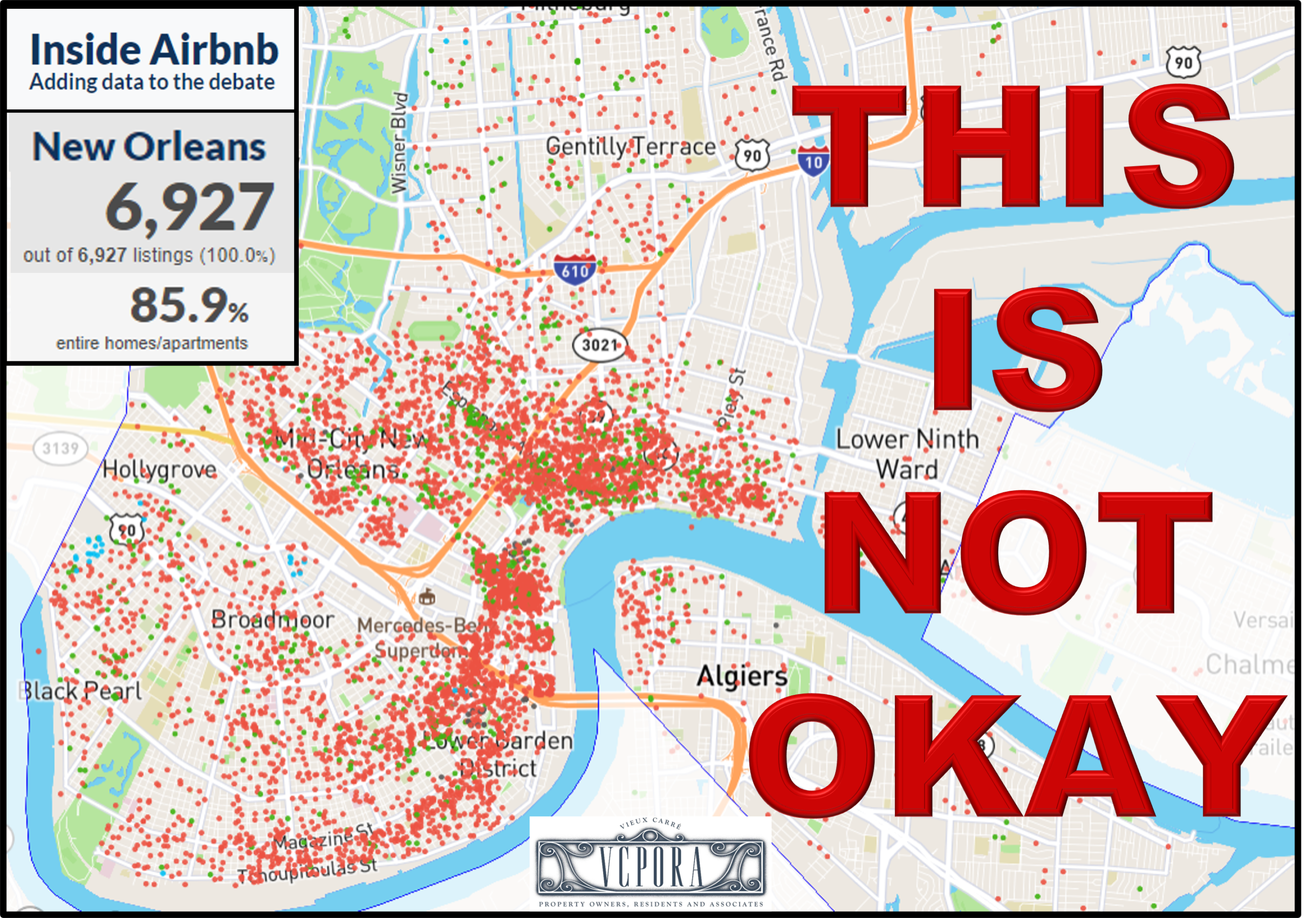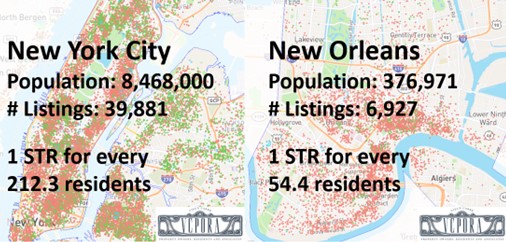
To: New Orleans City Planning Commission
1300 Perdido St #7
New Orleans, LA 70112
(via email)
Friday, January 13, 2023
Dear City Planning Commissioners and staff,

Let me begin by commiserating with you over having to do this for a third time. We acknowledge that this forced timeline leaves little room for a comprehensive solution to the short-term rental dilemma, particularly since the majority of the problems fall to a lack of enforcement, which is outside the scope of your jurisdiction. I wish we had more time to explore many options and opportunities for deeper public engagement on such an important issue. Yet, I am grateful for your prompt and careful attention to this matter.
As Executive Director of the Vieux Carré Property Owners, Residents and Associates (VCPORA), I am authorized to share our positions regarding the pending STR regulations. We wholeheartedly supported the Homestead Exemption requirement created in the last ordinance as the strongest protection against the over-proliferation of STRs in New Orleans neighborhoods. Since the 5th Circuit ruling deemed it unconstitutional, something equally restrictive, if not more so, needs to be put in place to fill its role.
Uphold the current prohibitions on STRs in the Vieux Carré and the Garden District
VCPORA remains in ABSOLUTE OPPOSITION to any further spread of STRs in the French Quarter. After the City Council voted to uphold the 50-year de facto moratorium on new French Quarter hotel accommodations in 2016 and 2019, we have begun seen a slow, but promising, reversal of residential decline as housing opportunities for younger professionals, families, and service industry workers have increasingly become more attainable. Now is not the time to derail that positive change.
If our city leaders recognized in 1969 that the proliferation of tourist accommodations was threatening its appeal and authenticity, then who could deny that threat is even more intense now?
The French Quarter has suffered for years because of a tendency to value short-term gain over long-term sustainability. Many of our leaders simply see this Landmark historic district and neighborhood as a cash cow, despite overwhelmingly intense pressures contributing to systemic infrastructure failure. We have already exceeded our carrying capacity by far. Handing over more of the French Quarter specifically to tourism will correlate with its further decline.
The rationale for allowing STRs in the French Quarter to reduce pressure on adjacent areas is fundamentally flawed. No STR operator making a significant profit in one neighborhood will sell and move into a new neighborhood – they will just buy another property. The market demand, coupled with deep investor pockets, will not evenly spread-out short term rentals through one-for-one replacement or course-correct for surrounding neighborhoods, it will just grow.
Simply put, the French Quarter is different:
- The City of New Orleans and State of Louisiana have recognized its difference through separate zoning, a separate historic regulatory commission, different taxing structures, and separate hotel requirements.
- Reports have shown that 85-95% of visitors to New Orleans visit the French Quarter. That number was 19.5 million pre-pandemic. No other neighborhood plays host to that many visitors.
- The French Quarter already has 70 operating hotels and B&B’s, with just over 7,000 rooms in only 28 of the hotels. (Note: I was only able to get room counts for less than half of the hotels – the real numbers are much higher.)
- The Quarter is, by far, the densest mixed-use neighborhood in the state. At only .67 square miles, it holds 4,694 housing units and 1,011 Occupational Business Licenses. It is home to 3,500 plus residents, despite a decades-long population decline (similar to that of the city as a whole).
- Within the two commercial zoning districts (VCC-1 & VCC-2) and the second entertainment district (VCE-1), I have identified 588 residential units, as noted by the City’s data that list multiple units for the same address. Additionally, there are over 800 address points that are not associated with an occupational license, suggesting that these can also be potential residential units. Expanding STRs into these districts would effectively remove housing units as options for people who want to call the French Quarter home. (Note: City employees verified that a true dwelling unit count is unavailable for the French Quarter, given its history of internal reconfiguration over the last 300 years.)
The studied effects of tourism gentrification have driven property values higher, making it less accessible as a place to call home despite its proximity to areas of employment. Allowing the conversion of even more residential units to STRs will only drive these property values even higher, pushing out more full-time residents and making it more expensive to live here. Commercializing residential opportunities reduces them, period.
More neighborhoods deserve this level of protection
It is undeniable that there are many neighborhoods that have been gutted of their housing supply because of conversion to STRs. The historic lack of enforcement has only made this more frustrating. Research through Inside Airbnb suggests there are 6,927 listings in the City, yet there are only a third of this amount licensed with the city.
To put it in in a more national scale, further research has indicated that New Orleans has nearly 4 times as many STR listings, per capita, than New York City. We have also beat out Los Angeles, Chicago, and San Francisco.

For this round of regulations to work, it is up to you to craft easily-enforceable and simple rules:
1. Expand Neighborhood Prohibitions AND Maintain Existing Prohibitions
Historic neighborhoods throughout the city have been hollowed out by the damaging effects of STRs. Prohibitions of STRs like those of the French Quarter and Garden District neighborhoods should be expanded to other historic neighborhoods such as Marigny, Tremé and others. These additional prohibitions will help return housing stock to the residential market and begin to reverse the corrosive effects of the past decade.
The French Quarter and Garden District neighborhoods should not lose their protections. The prohibition in these two neighborhoods will continue to preserve these two National Historic Landmark Districts as viable neighborhoods. The recent ruling by the United States Court of Appeals for the Fifth Circuit does not affect the current neighborhood specific prohibitions applicable to the Garden District and areas of the French Quarter.
2. No Residential Short Term Rentals
STRs are fundamentally a commercial use. They should be prohibited in all other residential zoning districts city-wide to protect housing opportunities for New Orleanians at all economic levels. STRs may be considered in residential districts when tied to the production of affordable housing, as in the case of the Small Multi-Family Affordable or Affordable Housing Planned Developments (limit to the same percentage of units required to be held affordable: 5% or 10%).
3. Density Restrictions by Square in Mixed Use and Commercial Districts
In mixed-use and commercial districts, where residential housing is a major component, strict caps on the number of STRs should be imposed by square, rather than block face. This allows for easier identification and regulation when buildings often have multiple addresses on corners. These should be restricted to 1 – 2 maximum, depending on intensity of underlying district.
4. Full time, On-site operators
A person over the age of 18 must reside at the Short Term Rental full time. This person must assume the responsibility of being the point of contact and mitigator for any disturbances emanating from the STR unit.
5. STRs are for a natural person only
Both the property owner and the permit holder must be a natural person and not a Limited Liability Corporation or some other incorporated entity. Additionally, STR permits should only be available to the actual property owner.
6. Enforcement & Adjudications
Nothing works without enforcement. Increase the capacity for enforcement by making the STR office fully funded through the collections of all permit fees and fines. Increase fees for permit lapses by month. Increase the number of adjudications and have a city attorney present during the hearings to reduce city liability and subsequent lawsuits. Increase the utilization of the daily fine structure as an effective deterrent for continued violations. Public announcements of violations and scheduled adjudication hearings should be sent out via the Notice Me notification tool.
7. Prevent the wholesale conversion of entire buildings into Hotels and STRs
Establish a land-use mechanism within the CZO to avoid entire residential apartment and condo buildings from being converted to short term rentals. Tie any building conversions or planned adaptive reuse projects for lodging accommodations to affordable set asides utilizing the Smart Mix Mandatory Inclusionary Zoning policy currently utilized.
8. Require Life Safety Code Adherence
All STRs should have a proof of liability insurance up to $1,000,000 and be equipped with sprinkler systems, exit signs, and ADA accessibility. Create an inspection system where each unit can be evaluated by a city employee with recurring inspections on a complaint-based system.
9. Increase trash collection fees for all STR permit holders
I believe that the goal of any revisions to the regulations should 1) further protect neighborhoods and those who live in them, and 2) increase ease of enforcement. You have the opportunity to send the strongest possible message to the City Council, the STR industry, and the public that the primary concern of our city is our citizens, all while establishing reasonable regulations for short-term rentals.
Thank you again for your dedication to this task; it is not an easy one.
Sincerely,
Erin Holmes
Executive Director
VCPORA

